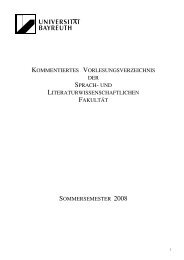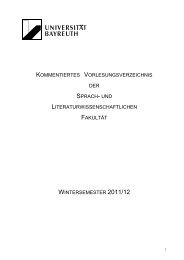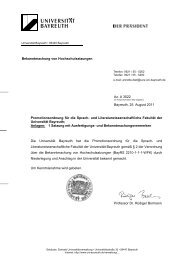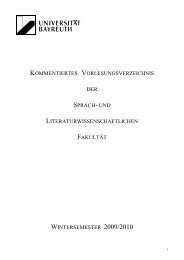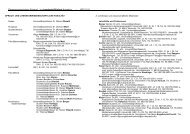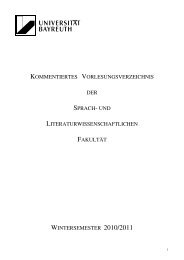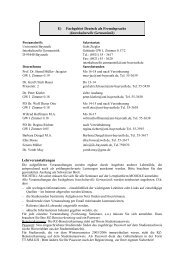Kommentiertes Vorlesungsverzeichnis Sommersemester 2013
Kommentiertes Vorlesungsverzeichnis Sommersemester 2013
Kommentiertes Vorlesungsverzeichnis Sommersemester 2013
Erfolgreiche ePaper selbst erstellen
Machen Sie aus Ihren PDF Publikationen ein blätterbares Flipbook mit unserer einzigartigen Google optimierten e-Paper Software.
Readings: Keane, Webb. 1997. Religious language. Annual Review of Anthropology 26:47-71.<br />
Mühleisen, Susanne. 2007. Language and religion. In Hellinger, Marlis and Anne Pauwels (eds.) Handbook of Language<br />
and Communication: Diversity and Change. Berlin: de Gruyter, 459-491.<br />
41154 Postcolonial Englishes<br />
BA (Teilgebiet 2.2), Lehramt A6, MAIAS (elective)<br />
Anchimbe<br />
PS 2st., Do 10-12,<br />
Colonialism was influential in the spread of English to other regions of the world. This course focuses on varieties of<br />
English that are the outcome of European colonialism, especially in Africa, South East Asia, and the Caribbean.<br />
Issues of interest include linguistic features, the functions and statuses of these Englishes as well as other sociolinguistic<br />
factors that make these Englishes part of their new ecologies. The processes of indigenisation or nativisation<br />
and their instantiations will be studied from both grammatical and sociohistorical perspectives.<br />
Reading: Schneider, Edgar. 2007. Postcolonial English: Varieties around the World. Cambridge: Cambridge University<br />
Press.<br />
41155 Text Linguistics<br />
BA (Teilgebiet 2.4), Lehramt A6, MAIAS (elective)<br />
PS 2st., Di 16-18,<br />
Anchimbe<br />
How are written texts composed Are texts within certain genres different from texts in other genres These questions<br />
are very important to text linguistics. This course will focus on aspects of grammar beyond the sentence, especially<br />
cohesion, coherence, intentionality, acceptability, informativity, contextuality and intertextuality in different<br />
genres in English. We will also be concerned with electronic text genres and how these have affected traditional text<br />
production at various levels: grammar, template, audience and medium. The class is particularly relevant for the<br />
preparation for the Staatsexamen!<br />
It is not necessary to register for this class.<br />
Reading: De Beaugrande, Robert A. & Wolfgang U. Dressler. 2001. Introduction to Text Linguistics. London: Longman.<br />
41156 English Phonology<br />
BA (Teilgebiet 2.1), Lehramt A6, MAIAS (elective)<br />
PS 2st., Di 10-12,<br />
Bieswanger<br />
Phonology is a sub-branch of linguistics concerned with the sound systems of languages, including the function and<br />
patterning of certain sounds in these systems. We will take a close look at the description, articulation and function<br />
of speech sounds, and compare the inventories of sounds used in English, German and other languages. Additional<br />
topics include suprasegmental phonology and issues related to connected speech. The class is particularly relevant<br />
for the preparation for the Staatsexamen!<br />
It is not necessary to register for this class.<br />
41157 Applied Linguistics<br />
BA (Teilgebiete 2.2, 2.4), Lehramt A6, MAIAS (elective)<br />
PS 2st., Mi 12-14,<br />
Bieswanger<br />
Applied linguistics is broadly defined as the application of linguistic knowledge to solve language related problems in<br />
the real world. As a result, applied linguistics is a highly interdisciplinary field and means many different things to<br />
many different people. We will discuss the different meanings of the term applied linguistics and a variety of key<br />
issues in the field, including language policy and planning, language maintenance as well as language death and<br />
language revitalization, multilingualism, language acquisition, language pedagogy, and language for specific purposes<br />
(LSP).<br />
It is not necessary to register for this class.<br />
41158 Language in the Workplace:<br />
BA (Teilgebiet 2.3), Lehramt A6, MAIAS (elective)<br />
PS 2st., Fr 10-12,<br />
Dayter<br />
In this course, we will approach communication and miscommunication in the workplace from a pragmatic perspective.<br />
A primary characteristic of workplace discourse is its task-related nature; however, many other constraints such<br />
as hierarchical structure, alignment along gender roles, or lack of agency in choosing one’s interlocutors enter into<br />
play among co-workers. We will look at the discourse and verbal interaction patterns of people communicating at<br />
work, including humour and small-talk among co-workers, strategies for negotiating problems, features of written<br />
workplace communication, and interaction within structured speech events such as meetings.<br />
It is not necessary to register for this class.<br />
41159 English Syntactic Structures:<br />
BA (Teilgebiet 2.1), Lehramt A6<br />
PS 2st., Do 12-14,<br />
Dayter<br />
This course is designed to introduce students to the study of syntax – the grammatical operations by which component<br />
words are combined together to form the overall sentence structure. We will take a look at descriptivestructuralist<br />
and generative models and will supplement our discussions with multiple exercises and examples from<br />
a range of human languages. The aim of the class is to provide students of language with sound knowledge of syntax<br />
as one of the core areas of linguistics and prepare them for further work in any syntactic theory. The class is<br />
particularly relevant for the preparation for the Staatsexamen!<br />
It is not necessary to register for this class.<br />
41160 Introduction to Middle English<br />
BA (Teilgebiet B 2.1), Lehramt A6<br />
PS, 2st., Mi 14-16,<br />
Schönweitz<br />
61



